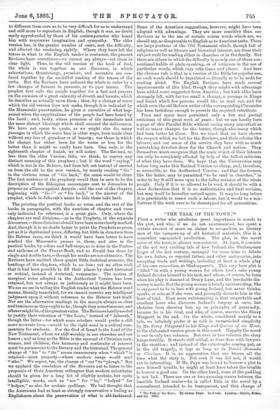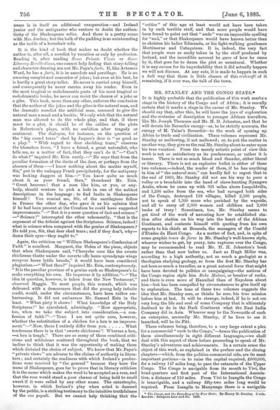"THE TALK OF THE TOWN."
Faom a writer who attributes great importance in novels to the plot, and who, if we do not misremember, has spent a certain amount of scorn on claims to recognition as literary men of the vampers-up of old historical materials, this is a somewhat unexpected production. The plot, in the novel sense of the term, is almost non-existent. At least, it consists of the not very exciting tale of how Ireland, the Shakespeare forger of the last century, managed for some time to delude his own father, or reputed father, and other antiquaries, into accepting deeds and writings, including at least a whole play of his own concoction, as Shakespeare's. This very bare plot is " filled " in with a young woman for whose love's sake young Ireland devotes himself to his task, and whom, of course, he loses when his play is damned at Drury Lane, and the inevitable discovery is made. But the young woman is totally uninteresting. She is supposed to be in love with young Ireland, but never think'', speaks, or acts as if she were, and promptly discards him in the hour of trial. Even more uninteresting is that respectable and excellent lover who discovers Ireland's forgery at once, but abstains from showing him up on principles of generosity, because he is his rival, and who, of course, marries the flimsy Margaret in the end. On the whole, considered merely as a tale, we infinitely prefer it as told in unvarnished simplicity by Mr. Percy Fitzgerald in his Kings and Queens of an Hour, to the elaborated version given in this novel. Happily the novel is one in only two volumes. But even in two volumes the story hangs terribly. It stands still withal, as time does with lawyer& in the vacation ; and instead of the catastrophe coming pat, as in the old tragedy, it lags as long as in Daniel Deronda or Clarissa. It is an aggravation that one knows all the time what the story is. But even if one did not, it would, not be interesting. If Mr. Payn was bound to borrow a plot to save himself trouble, he might at least have taken the tronble to borrow a good one. On the other hand, some of the padding is not bad. There are one or two amusing scenes between the irascible Ireland senior—he is called Erin in the novel by a concealment intended to be transparent, and that change of
name is in itself an additional exasperation—and Ireland junior and the antiquaries who venture to doubt the authenticity of the Shakespeare relics. And there is a pretty scene with Mrs. Jordan; but the bulk of the padding is as uninteresting as the inside of a horsehair sofa.
It is the kind of book that makes us doubt whether the author is, after all, a novelist by vocation or only by profession. Reading it, after reading Some Private Views or Some Literary Recollectiorts, one cannot help feeling that story-telling and character-drawing are not Mr. Payn's forte. If, like Artemus Ward, he has a forte, it is in anecdote and persiflage. He is an amusing essayist and concocter of jokes ; but even at his beat, he is hardly a great story-teller. He never is carried away himself, and consequently he never carries away his reader. Even in the most tragical or melodramatic parts of his most tragical or melodramatic books, he never can resist the chance of a joke or a gibe. This book, more than any other, enforces the conclusion that the author of the jokes and the gibes is the natural man, and the dramatic novelist the artificial man, assumed to give the natural man a mask and a buskin. We only wish that the natural man was allowed to do the whole play, and that, if there must be a plot, it should be of the calibre of the plots in Robertson's plays, with no ambition after tragedy or sentiment. The dialogue, for instance, on the question of the "big round tears" shed by Jaques's deer is "as good as a play." "With regard to deer shedding tears," observes the blameless lover, "I have a friend, a great naturalist, who tells me, as a matter of fact, that they can't do it."—" Can't do what ?" inquired Mr. Erin curtly.—" He says that from the peculiar formation of the ducts of the deer, or perhaps from the absence of them—I know nothing about the matter myself, Sir," put in the unhappy Frank precipitately, for the antiquary was looking daggers at him.—" You know quite as much about it as your friend, then," thundered Mr. Erin. "Great heavens ! that a man like him, or you, or anybody, should venture to pick a hole in one of the noblest -descriptions in the language : to find faults in Shakespeare himself ! You remind me, Sir, of the sacrilegious fellow in France the other day, who gave it as his opinion that if he had been present at the Creation he could have suggested improvements."—" But it is a mere question of fact and science." —" Science !" interrupted the other vehemently, "that is the argument of the Atheist against the Scriptures. Science, indeed ! what is science when compared with the genius of Shakespeare ? He told you, Sir, that deer shed tears ; and if they don't, why— damn their eyes—they ought to."
Again, the criticism on "William Shakespeare's Confession of Faith" is excellent. Margaret, the Helen of the piece, objects that when Shakespeare said, " Cheryshe rine like the sweete chickenne thatte under the coverte offe heere spreadynge wings receyves heere lyttle broode," it would have been considered plagiarism.—" What then?" inquired Mr. Erin, contemptuously.
It is the peculiar province of a genius such as Shakespeare's to make everything his own. He improves it by addition."—" The idea in question, however, is taken from the New Testament," observed Maggie. To most people, this remark, which was delivered with a demureness that did the young lady infinite credit, would, under the circumstances, have been rather embarrassing. It did not embarrass Mr. Samuel Erin in the least. "What piety it shows ! What knowledge of the Holy Scriptures !" he ejaculated, admiringly. "How appropriate, too, when we take the subject into consideration,—a confession of faith !"—" True. I am not quite sure, however, whether the substitution of a chicken for a hen is an improve ment."—" Now, there I entirely differ from you What tenderness there is in that 'sweets chickenne '! Whereas a hen, —a hen is tough." There are so many of these combined criticisms and witticisms scattered throughout the book, that we incline to think that it was the opportunity of making them which dictated the choice of subject. We know that Mr. Payn's "private views" are adverse to the claims of authority in literature; and certainly the readiness with which Ireland's productions were received by "the general" because they bore the name of Shakespeare, goes far to prove that in literary criticism it is the name which makes the weed to be accepted as a rose, and that the rose would stand a poor chance of being held to smell sweet if it were called by any other name. The catastrophe, however, in which Ireland's play when acted is damned by the public, is a striking testimony to the intuitive truthfulness of the vox populi. But we cannot help thinking that the " critics " of this age at least would not have been taken in by such terrible stuff, and that more people would have been found to point out that "aside" was an impossible spelling for "and," or that Shakespeare would have known better than to christen his ladies Edmunda, or his light-walking gentlemen Mortimerns and Cataquinns. It is, indeed, the very fact that people were so easily taken in by the stuff produced by Ireland, and the incredible account he gave of how he came by it, that goes far to damn the plot as unnatural. Whether it is any excuse for its improbability that it did actually happen we will not discuss. At any rate, it is made to happen in such a dull way that there is little chance of this rechauffe of it remaining, if it ever was, the talk of the town.



































 Previous page
Previous page